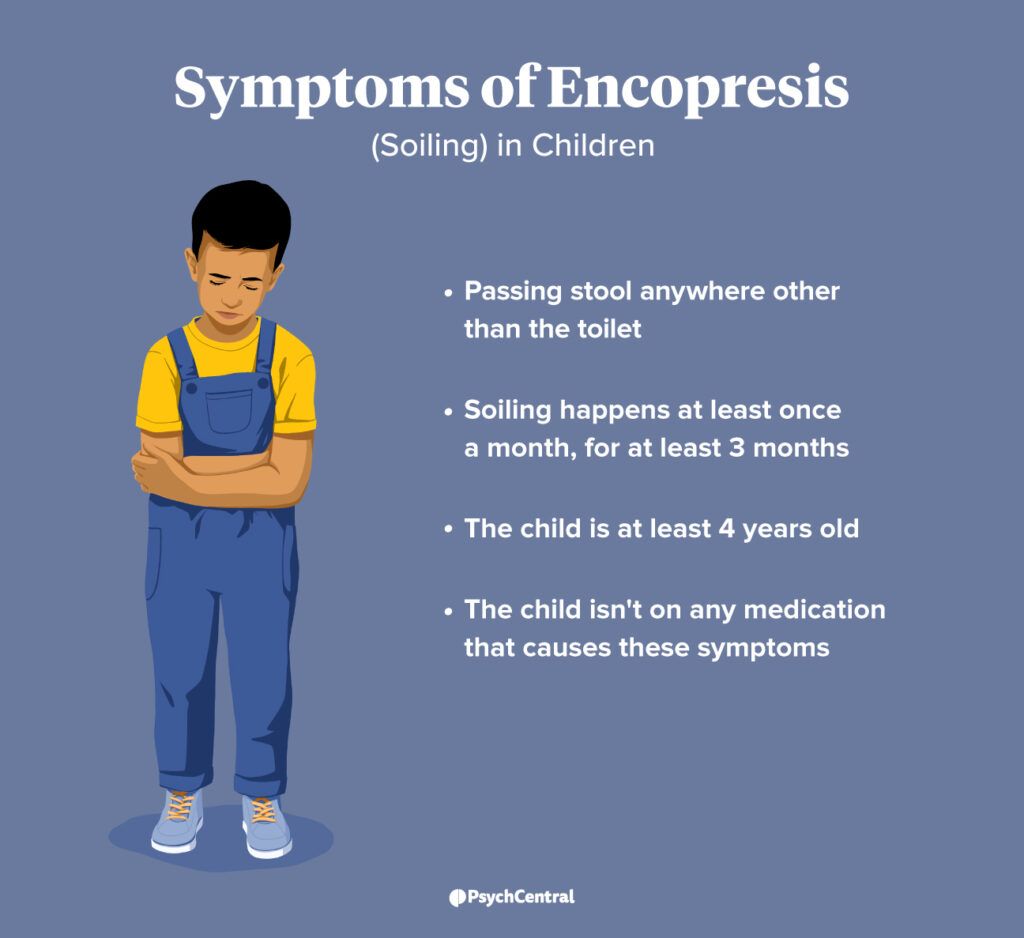When a child is soiling themselves, either on purpose or by accident, it’s known as encopresis. It can cause stress for both you and them.
Encopresis, also known as soiling or fecal incontinence, usually happens in children. It refers to passing stool in places other than the toilet.
According to the Society of Pediatric Psychology, around 4% of 4-year-olds and 1.6% of 10-year-olds develop fecal incontinence. It’s more common in males than females.
Common causes of encopresis include:
- stress
- difficulty with potty training
- fear around the passing of stool
Understanding the symptoms of encopresis and why it happens can help you quickly address the situation and help your child.

Encopresis refers to when a child empties their bowels anywhere but the toilet. It can be voluntary or involuntary. Your child may do this in their clothes, on the floor, or elsewhere.
This condition commonly develops if a child begins to delay going to the bathroom, which can happen for various reasons, including constipation.
For example, your child may experience a painful bowel movement and become afraid of passing stool. When they get the urge to go to the bathroom, they might try to hold it in. The urge to go may temporarily go away. But eventually, the stool will accumulate and harden, making it more difficult to go to the bathroom.
Sometimes, softer or more liquid stool may pass through without them noticing. This is called overflow incontinence. This can cause your child to feel embarrassed or ashamed, which encourages the holding behavior and continues the cycle of encopresis.
Children with encopresis may be
A medical professional will diagnose your child with encopresis if they:
- have bowel movements in inappropriate places
- have inappropriate bowel movements at least once a month for at least 3 months
- are at least 4 years old
- aren’t on any medication that causes the soiling
Sometimes, children with encopresis experience enuresis, also known as urinating in inappropriate places.
Children with encopresis may have more frequent urinary tract infections (UTIs). This can happen when bacteria from soiled underwear enter the urinary tract.
Children with encopresis may also complain that their stomach hurts. This happens because constipation can cause:
- abdominal pain
- bloating
- cramping
Before diagnosing encopresis, doctors will rule out any possible medical causes, such as
- blockages
- chronic constipation
- abdominal swelling
The root cause of encopresis is chronic constipation. Chronic constipation can happen for several reasons, including because a child holds their bowel movements in. They may hold their stool consciously or unconsciously.
There’s no obvious medical cause for constipation in most children with encopresis.
Some things that may cause encopresis include:
- having painful bowel movements, which might encourage children to hold it
- stressful events, like going to a new school
- having a tough time with toilet training
The age at which a child starts potty training doesn’t seem to impact the onset of encopresis. A
Your child may begin to hold their stool, creating a cycle of constipation and overflow incontinence because they:
- have an unusually painful bowel movement
- have an anal fissure
- have an infection
- don’t want to use the toilet in a specific environment, like at school
- don’t want to stop doing what they’re doing to use the bathroom
Other things that can make it more likely for a child to develop encopresis include:
- having a low socioeconomic background
- experiencing trauma, such as abuse or neglect, which can cause children to regress to an earlier stage of development
- having to defecate in unhygienic environments
- living in a war zone
- living in an urban area
- being hospitalized for something other than encopresis
- bullying
Children with encopresis also commonly experience other mental health conditions like:
- depression
- anxiety
- oppositional behavioral disorders
- aggression
- social withdrawal
A combination of medication and behavioral therapy is often the most successful treatment for encopresis.
Medication and lifestyle changes
Treatment for constipation may include oral or rectal medications, such as stool softeners to flush out the bowels. Your child’s pediatrician may prescribe polyethylene glycol (PEG) for this.
Other options for treating constipation include:
- eating high fiber foods, such as fruits and vegetables
- lowering sugar and fat intake
- reducing foods in the diet that can cause constipation, like dairy and bananas
- increasing fluid intake
- increasing physical activity
- including probiotics in the diet
In some cases, a doctor may need to physically remove impacted stool.
Behavioral treatment
Behavioral treatment helps encourage healthy bowel movements. This might include:
- regularly encouraging your child to sit on the toilet
- rewarding your child for appropriate toilet-related behavior
It might be helpful, for example, for your child to sit on the toilet after meals, when they’re more likely to empty their bowels.
You may also find it useful to keep a log of your child’s progress. Logging information can help with finding the best schedule for toilet training.
It’s important for parents and caregivers not to punish children for soiling themselves. This can backfire and make the problem worse.
Behavioral training usually involves being clear with the child that the situation isn’t their fault. It may also include educating the family and child about typical defecation and what causes constipation.
It can also involve physical therapy to improve pelvic floor muscle awareness and help the child better control their bowel movements.
This might involve teaching a child to have better posture while sitting on the toilet by avoiding slouching, which makes it harder to pass stool. A physical therapist may also work with your child on the following:
- body awareness
- how to isolate the pelvic floor muscles
- breathing exercises
- toilet relaxation exercises
In
If your child is experiencing encopresis, the first step is to get them evaluated by a qualified medical professional, like a pediatrician.
They can rule out any potential medical causes and make treatment recommendations.
While many children can outgrow encopresis, it’s something that may continue into adulthood if it’s not addressed during childhood. Assuming your child will outgrow encopresis may cause them unnecessary emotional stress.
If your child is soiling themselves and experiencing chronic constipation, consider making an appointment with a pediatrician to rule out any underlying medical causes.
A pediatrician can offer treatment options to help with encopresis, such as medications and toilet training strategies.
If your child’s encopresis is stress-related, it may also help to enlist the support of a qualified mental health professional.
